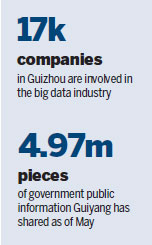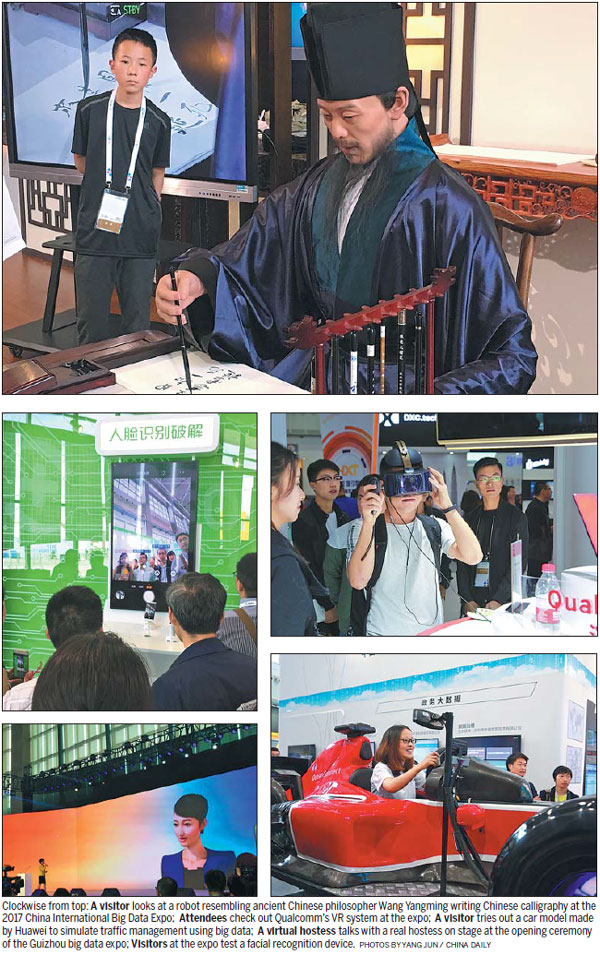
Professionals and enthusiasts witness expanding capabilities and real-world applications of the field, Chen Meiling reports.
A robot in traditional Chinese garb wrote lines of poetry in calligraphy. Kids wore virtual reality glasses to explore Buddhist caves and historical museums. Self-circulating water systems connected to computer generated graphs of flow and pressure.
The first day of the 2017 China International Big Data Expo was full of fascinating machinery and high-tech novelty items.
The annual event was held for the third time since 2015 in Guiyang, capital of Southwest China's Guizhou province, from May 25 to 28, attracting big names in the IT industry like Tencent, Alibaba, JD and ZTE, 14 foreign researchers from the Silicon Valley, local big data companies and more than 1,000 big data appliance companies from around the world.

Yang Jian, general manager of Beijing Ganwei Robot Tech Co Ltd, founded in 2015, said the calligraphy-writing robot, made in half a year, is made to resemble Chinese philosopher Wang Yangming, from the Ming Dynasty (1368-1644), both in appearance and in handwriting.
Full texts of Chuan Xi Lu, one of the major works explaining Wang's philosophy, were uploaded into the robot's database. When the audience asked a question, he would answer with a sentence from the book through speech synthesis, Yang said.
Mu Degui, deputy governor of Guizhou province, said at a forum at the expo that Guizhou sees big data as an engine of local economic and social development. It will explore a broader application of the technology in the next five years in commercial, political and civil affairs through promoting the digital economy and Internet Plus initiative.
"Big data will serve the transformation and upgrading of the economy and improvement of government regulations, and bring social benefits," said Mu, who is also a member of the Standing Committee of the Guizhou CPC Provincial Committee and head of the Publicity Department of Guizhou province.
In February 2016, the central government approved Guizhou's plan to become the national big data experimental zone.
In recent years, world-leading giants have conducted their big data projects in the province, including a government information-sharing platform co-developed with Alibaba, makerspaces constructed with Intel and chips and cloud computing projects with Dell.
Alibaba Group announced on May 25 its intention to build the company's first big data school in Guiyang, together with the Guizhou Institute of Technology, to cultivate 10,000 undergraduates in five years.
The first group of students will be enrolled in autumn this year.
The unveiling ceremony of China's first big data application lab was held in Guiyang on May 25, focusing on research of government data's collection, analysis, sharing and security.
Since the standing committee of Guiyang's people's congress approved the government information sharing system in January, Guiyang has released 4.97 million pieces of information in fields including transportation, sanitation, finance and education, with more than 40,000 downloads and 120,000 visitors by May.
The Cloud Guizhou application will also be linked to the national platform, marking the first Chinese province to bridge its data to the national system.
Cheng Xiaobo, director of the State Information Center, said it has become a trend to apply big data to economic development, social management and improvement of government services and regulations.
According to a big data development plan released by the Ministry of Industry and Information Technology of China in January, the income of big data products and services will surpass 1 trillion yuan ($145.60 billion) by 2020 with an annual compound growth rate of about 30 percent.
Guizhou now has more than 17,000 big data companies, more than 200 business giants, 38 national and provincial research centers and 200 innovation and entrepreneurship teams.
Big data has also been used in the daily life of local people.
The big screen of the booth of Electronic Guizhou showed an application released by the local government in early May to provide information of charging facilities for electric cars.
Zhao Yuanliang, secretary-general of a promotional society for construction of electric vehicle charging facilities, said the app can also monitor the distribution of charging facilities, the classification of users and frequency of different payment methods.
"We have learnt from some developed Chinese cities that already had charging facilities that drivers usually had to download several apps since each was operated by a different company," he said.
In 2016, Guizhou developed an app through which information on charging facilities was gathered and managed by only one portal. The government can quickly know how many stations are located in one place and how often they are used to help in the planning of more charging facilities.
Chen Min'er, Guizhou's provincial Communist Party of China chief, said: "Driven by big data, the pattern of economic and social development in Guizhou is undergoing profound changes. The capabilities and awareness of collecting and using big data have all strengthened among government departments, enterprises, experts and citizens."
The province will further practice the open development concept, and build and use the Cloud Guizhou platform to accumulate more resources, Chen said.
"We will use data to bring flows of technology, supplies, talent and funds, so as to accelerate the construction of an open inland economic experimental zone."
Contact the writer at chenmeiling@chinadaily.com.cn

(China Daily 05/27/2017 page10)